- Home
- Fergus Hume
A Coin of Edward VII: A Detective Story Page 12
A Coin of Edward VII: A Detective Story Read online
Page 12
CHAPTER XI
PRINCESS KARACSAY
Even as he spoke the room was flooded with the light of the electriclamps. The woman by the window turned and came forward smiling. With afeeling of bitter disappointment Giles recoiled. It was not Anne. He hadbeen deceived by a chance resemblance.
"I can quite understand your mistake," said the Princess Karacsay. "Itis not the first time that I have been taken for my friend."
Indeed, she was very like Anne, both in figure and face. She had thesame dark hair and dark eyes, the same oval face and rich coloring. Buther expression was different. She was more haughty than Miss Denham, andthere was less simplicity in her manner. Even as Ware looked at her thelikeness seemed to vanish, and he wondered that he should have made sucha mistake. But for the twilight, the turn of her head, and her height,together with the way in which she carried herself, he would not havebeen deceived.
"One would take you for Miss Denham's sister," he said when seated.
The Princess smiled oddly. "We are alike in many ways," she repliedquietly. "I look upon Miss Denham as my second self. You called me Annewhen you mistook me for her," she added, with a keen glance.
"I have no right to do so, Princess, but----" He hesitated, not knowinghow to choose his words. She saw his perplexity and smiled.
"I quite understand, Mr. Ware."
"Anne--I mean Miss Denham--has told you about me?"
"I have not seen her for months, Mr. Ware, not since that terrible eventwhich has made a fugitive of her."
Giles was bitterly disappointed, and his face showed his feelings. Fromwhat Mrs. Cairns had said he was certain that the Princess would be ableto help him, and here she confessed an ignorance of Anne's whereabouts.Nevertheless Ware still hoped. He thought that not knowing his realerrand, she was feigning ignorance for the sake of her friend's safety."I am sorry she has not spoken to you about me," he remarked, "for thenyou would know that I wish her well."
"Oh, I know that. Anne--I may as well call her Anne to you, Mr.Ware--wrote to me from Rickwell several times. She told me all aboutyou. But I have not seen her since the death of your fiancee. I have noidea where she is now."
"I thought--and Mrs. Cairns thought--that she would come to you in herdistress, or at least communicate her whereabouts."
"She has done neither, and I do not know where to address a letter."
"What is to be done?" said Giles half to himself and much distressed.
Princess Karacsay rose and glanced at the clock with a laugh. "Oh, if wetalk, something may come of our putting our heads together," she said."Meantime we can make ourselves comfortable. Here are coffee andcigarettes, Mr. Ware. Would you prefer a cigar?"
"No, thank you, Princess. These look very good."
"Both coffee and cigarettes are Turkish," said she, handing him a cupand afterwards a cigarette. "I get them from a cousin of mine who is anattache at Constantinople. Come now." She lighted a cigarette forherself and sat down on an amber divan near Ware's chair. "Let us talkbefore my friend arrives."
"I beg your pardon, Princess, I hope my coming----"
"No, no," she explained hurriedly. "I asked my friend to meet you."
"Indeed." Giles was much surprised. "I did not know we had a mutualfriend."
The Princess nodded and blew a cloud of smoke. "At ten o'clock you shallsee him. I won't tell you who he is. A little surprise, Mr. Ware."
Ware looked at her sharply, but could make nothing of the enigmaticsmile on her face. She was undeniably a very beautiful woman as shelounged amongst the amber-tinted cushions, but in her dress and generallooks there was something barbaric. She wore a dinner dress of mingledscarlet and black, and many chains of sequins which jingled with herevery movement. As Ware's eyes met her own she flashed a languorous lookat him, and a slow smile wreathed her full red lips. Giles could nothelp admiring her, but he had a feeling that she was not altogether tobe trusted. It behove him to be wary in dealing with this superbtigress. Yet, as another thought crossed his mind, he smiledinvoluntarily.
"Why do you smile, Mr. Ware?" asked the Princess. She spoke the Englishlanguage admirably, and with but a little foreign accent.
"Pardon," replied Giles, still smiling, "but Mrs. Cairns told me thatat one time you aspired to become a governess. I can't imagine youteaching children."
"Ah, you have no imagination--no Englishman has. Children are fond ofme--very fond." She cast another look at his handsome face, and addedwith emphasis, "I can make any one I choose fond of me."
"I quite believe it, Princess. You have woman's imperialsceptre--beauty."
"A charming compliment," responded she, her mood changing, "but we arenot here to exchange compliments. So you love Anne?"
"With all my heart and soul," he replied fervently.
His hostess appeared rather disconcerted by this reply. "You are amiracle of chivalry, my dear Mr. Ware," she said dryly. "But is it notrather a large heart you have to love two women at the same time?"
"I understand what you mean," answered Ware quietly, "but my engagementto Miss Kent was purely a family arrangement. I loved Anne--I still loveher. All the same, I would have married Miss Kent had she not beenmurdered."
"You are very obedient, Mr. Ware."
"And you very satirical, Princess. I could explain, but there is no needfor me to do so. I want to find Anne. Can you help me?"
"Not at present, but I may be able to do so. Of course, you don'tbelieve that she killed your fiancee?"
"Certainly not. I think the crime was committed by the man with whom shefled."
"A tall man with a red beard and hair and black eyes?"
"Yes, yes. Do you know him? Who is he?"
"I have had him described to me," responded the Princess calmly, "but Iknow nothing about him."
"Is he a friend of Anne's?"
"That I don't know."
She quietly selected another cigarette, lighted it, and looked with aserene smile at her visitor. Giles was annoyed. "We don't seem to begetting on with our business, Princess," he said roughly.
"What is our business?" she demanded, looking at him through half-closedeyes. Her scrutiny made Giles uncomfortable, and he shifted his seat ashe answered.
"Mrs. Cairns said you could tell me about Anne."
"So I can. What do you want to know, Mr. Ware?"
"Who is she? Who was her father? Is he dead or alive? What do you knowabout the Scarlet Cross, and----" He stopped, for the Princess hadopened her eyes to their fullest extent.
"The Scarlet Cross. You know about that also?" she asked.
"Of course I do. There was an anonymous letter----"
"I have seen the letter, or at least a copy."
"Indeed," said Ware, much astonished, "and an enamelled cross----"
"I have seen the cross also."
"It appears to me, Princess, that you know everything about the case."
She glanced again at the clock, and smiled as she replied, "I am afriend of Anne's, Mr. Ware. I daresay you would like to know who told meall these things. Well, you shall be enlightened at ten o'clock.Meantime I can tell you all I do know about Anne and her father."
"You will speak freely?" he asked mistrustfully.
"Absolutely. You--you--" she hesitated--"you love Anne." She gave him asearching look. "Yes, I see you do. I can speak openly. Will you haveanother cup of coffee? No! Another cigarette. Ah, there is the box. Amatch. Now."
"Now," said Giles eagerly, "what about Anne?"
"What about myself first of all, Mr. Ware. I am a Hungarian. Iquarrelled with my people and ran away. Finding myself stranded inLondon with very little money, I tried to get a post as a governess. Iwent to Mrs. Cairns, and thus became acquainted with Anne. We becamegreat friends. She told me everything about herself. When I knew herhistory we became greater friends than ever. I was a governess only fora year. Then someone heard me sing, and----"--she shrugged her beautifulshoulders--"but that is quite another story, Mr. Ware. I am aconcert-singer now, a
nd it pays me excellently."
"I am very pleased with your success, Princess. But Anne?"
She flashed a rather annoyed look at him. "You are scarcely sochivalrous as I thought, Mr. Ware," she said coldly. "No, say nothing; Iquite understand. Let us talk of Anne. I will tell you her history." Shere-lighted her cigarette, which had gone out, and continued, "Her fatherwas a gambler and a wanderer. He lived mostly on the Continent--MonteCarlo for choice. Anne's mother"--here the Princess paused, and thenwent on with an obvious effort--"I know nothing of Anne's mother, Mr.Ware. She died when Anne was a child. Mr. Denham brought up his daughterin a haphazard way."
"Was his name really Denham?"
"So Anne told me. I had no reason to think that it was otherwise. He wasa gentleman of good family, but an outcast from his people by reason ofhis reckless folly. I also am an outcast," said she pleasantly, "butmerely because I am strong-minded. I am not foolish."
"No, Princess," said Giles, looking keenly at her, "I should certainlynot call you foolish."
"But I can be foolish on occasions," said she quickly, and flushed asshe glanced at him, "like all women. But Anne--I see we must get back toAnne. Well, she, having better moral principles than her father, grewwearied of their wandering life. She decided to become a governess. Mr.Denham put her to school at Hampstead--a sister of Mrs. Cairns keeps theschool, and that is why Anne is so intimate with Mrs. Cairns--and whenher education was finished she took a situation in Italy. There sheremained some years. Afterwards she rejoined her father for a time. Hedied at Florence--typhoid fever, I believe--and Anne found herselfalone. She returned to England, and assisted by Mrs. Cairns, tookvarious situations. She always returned to Mrs. Cairns when out of anengagement. It was on one of these occasions that I met her. We havebeen friends for a long time, Mr. Ware. Then Anne was engaged by Mrs.Morley, and--and the rest you know. There is no more to be said."
"Is that all?" said Giles, disappointed by this bald narrative.
The Princess shrugged her shoulders, and throwing aside her cigarette,leaned back with her hands behind her head. "What would you, Mr. Ware?Anne is a good woman. Good women never have any history."
"Can you tell me anything about the Scarlet Cross?"
"Anne never spoke of such a thing to me. But my friend may be able totell you. Ah!"--the Princess raised her head as a ring came to thedoor--"there is my friend. Before his time, too. But we have finishedour conversation, Mr. Ware."
"For the present, yes."
She looked at him suddenly. "But certainly," she said in her vivaciousway, "you must come and see me again. We will have much to talk of. Youlove music. I will sing to you, and----" Here she broke off to greet anew-comer, much to the relief of Giles, who was beginning to feeluncomfortable. "How do you do, Mr. Steel?"
With an exclamation Ware rose. It was indeed Steel who stood before himlooking as round and rosy and cheerful as ever. "You are surprised tosee me, sir," he said, with a twinkle.
"I am very much surprised. I went to see you yesterday----"
"And found that I was out of town. So I was, so I am supposed to be, butthe telegram of the Princess here told me that she expected you thisevening, so I left my country business and came up."
"You see," said the Princess, sitting down again amongst her cushions,"you see, Mr. Ware, I told you we had a mutual friend. Now you know howI am so well acquainted with the case," and she laughed.
"The Princess," explained Steel, seeing Giles' astonishment, "read allabout the case. Being a friend of Miss Denham's and seeing that I hadcharge of the matter, she sent for me. We have talked over the case, andI have received much assistance from Miss--I mean from this very cleverlady, the Princess Karacsay," and Steel bowed.
"But," stammered Ware, still puzzled, "you believe Miss Denham to beguilty. Surely the Princess will not----"
"No, no!" came from the divan in the deep-toned voice of the woman."Anne is my friend. I would not help him to arrest her."
"The fact is," said Steel easily, "I have changed my opinion, Mr. Ware,and I think Miss Denham is innocent. The man who killed Miss Kent iscalled Wilson."
"Wilson. And who is Wilson, and why did he kill her?"
"I don't know who Wilson is," replied Steel. "I am trying to find out. Iam not quite certain why he killed her, but I am beginning to suspectthat it was on account of this inherited money. I told you that,Princess," he added, turning to the divan.
"Yes, Mr. Steel. And I said then, I say now, I do not agree."
"If you would be more explicit," said Ware, feeling helpless.
Steel took no notice of him for the moment. "Then if it's not the moneyI don't know what the motive can be." He turned to Ware. "See here, sir.This Wilson, whomsoever he may be, lived with the mother of Asher'soffice-boy--he was her lodger. The boy told him about the money comingto Miss Kent. Afterwards the lad had a summons given him to serve onMorley. Wilson offered to take it, and did so. He removed his effectsfrom Mrs. Benker's house--she's the mother of the lad--and went down toRickwell. You know what happened there. Now if he didn't kill Miss Kenton account of the money, why did he ask the office-boy about thematter?"
Giles shook his head. "I can't say," he said, "no more than I canexplain why Miss Denham helped him to escape."
"Well,"--Steel scratched his chin--"I have an idea about that. But youmust not be offended if I speak plainly, Mr. Ware."
"I shall be offended if you speak evil of my friend Miss Denham." Thiswas from the Princess, who raised herself up with her eyes flashingangrily. "I will not have it," she said.
"Then am I to say nothing?" asked Steel ironically.
"Nothing against Miss Denham," put in Giles.
"You are both rather difficult to deal with," remarked Steel, with ashrug. "However, I'll explain, and you can draw your own inferences. Itseems from what Mrs. Benker said that Mr. Wilson was mostly out allnight and in all day. Also he was frequently absent for a long time. Helikewise took much interest in Society newspapers and in the movementsof the aristocracy. He also wore on his chain an ornament--ared-enamelled cross, in fact."
"What!" cried Giles, with a start, and he noted that the Princessstarted likewise, and that her face grew pale.
"He wore a red-enamelled cross," repeated Steel imperturbably, "on hiswatch-chain. Mrs. Benker had been in the service of the late LadySummersdale when the diamonds of that lady were stolen. She rememberedthat a red-enamelled cross had been found in the safe whence the jewelswere taken. Wilson was amused at this. He said that the cross was theemblem of a charitable society from which he received a weekly sum.Well"--he hesitated and looked at his listeners--"that clue came to anend. I lost sight of Wilson. I then went to look for _The RedCross_--the yacht, I mean!"
"What has the yacht to do with Wilson?" asked Ware angrily.
"If you remember, sir, I told you that Wilson was the man who served thesummons on Mr. Morley, and who, as I believed, killed Miss Kent. Heafterwards fled with Miss Denham and went on board the yacht. Is notthat the case, sir?"
"So far as I can judge, it is," muttered Giles reluctantly.
"Well, then," went on Steel triumphantly, while the Princess--as Gilesobserved--listened intently, "I looked after that yacht. I could notfind her, but I am looking for her now. That is why I am in the country.I came up this morning from Deal, and I go back there to-morrow. I find,sir, that this yacht puts in at various places every now and then."
"Most yachts do."
"Yes, sir. But while most yachts are at anchor in a place does aburglary invariably occur? No, sir, wait," for Giles had sprung to hisfeet. "Lady Summersdale's place was on the seashore. Her diamonds werestolen. At the time this yacht was at anchor in the bay. A red cross wasfound in the safe. The boat is called by that name. Several times I findthat when the yacht has been at a certain place a burglary has occurred.This man Wilson wears a red cross on his watch-chain. Now, sir, Ibelieve that he is one of a gang of burglars--that the cross is a sign.This explains his interest in the Society pape
rs. He wants to find outwhere the best swag is to be found, and----"
"But what has all this to do with my friend Anne?" cried the Princess.
Steel shrugged his shoulders. "I say nothing," he replied. "You can drawyour own inferences."
"Do you mean to say that Miss Denham----"
"I say nothing," interrupted Steel, catching up his hat. "Mr. Ware, I amat your service when you want me. Princess!" He bowed and went out.
As the outer door closed Giles and his hostess looked at one another."The man's a foul liar," burst out Giles furiously.
"Yes." The woman was very pale. "Still, my friend Anne once toldme----"
"Told you what?"
"What I will tell you if you come again," she said under her breath, andsuddenly left the room. She did not return.

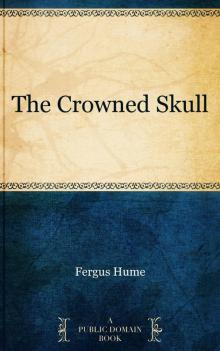 The Crowned Skull
The Crowned Skull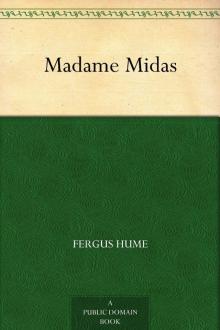 Madame Midas
Madame Midas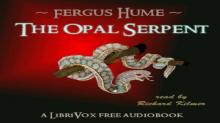 The Opal Serpent
The Opal Serpent The Solitary Farm
The Solitary Farm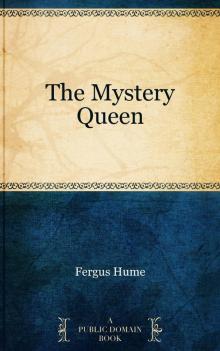 The Mystery Queen
The Mystery Queen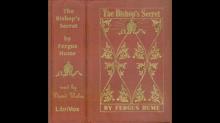 The Bishop's Secret
The Bishop's Secret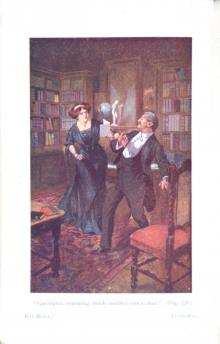 Red Money
Red Money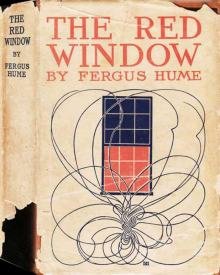 The Red Window
The Red Window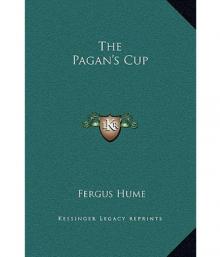 The Pagan's Cup
The Pagan's Cup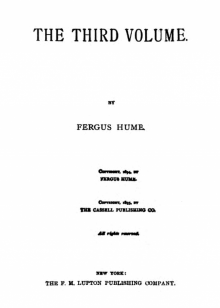 The Third Volume
The Third Volume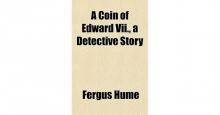 A Coin of Edward VII: A Detective Story
A Coin of Edward VII: A Detective Story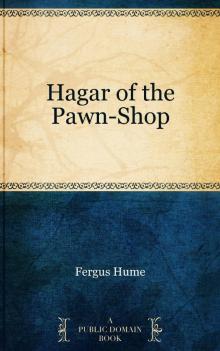 Hagar of the Pawn-Shop
Hagar of the Pawn-Shop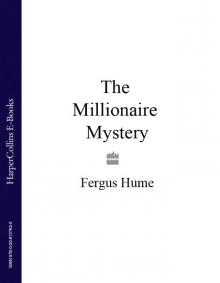 The Millionaire Mystery
The Millionaire Mystery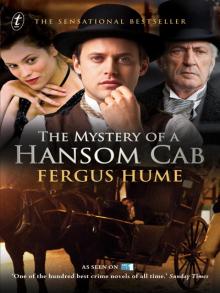 The Mystery of a Hansom Cab
The Mystery of a Hansom Cab